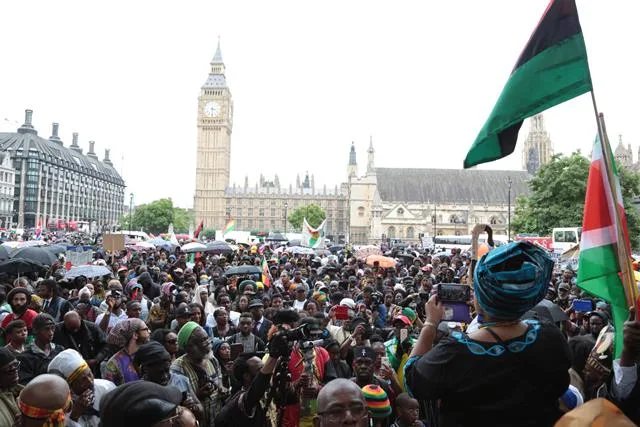
[These are two excerpts from an article in The Round Table: The Commonwealth Journal of International Affairs.]
Introduction
Hilary Beckles (Citation2019) argues that the reparations movement is the most significant political tide of the 21st century in creating a just world. The Caribbean Community’s (CARICOM) Reparations Campaign is part of a larger conversation in the new worldmaking process. CARICOM’s campaign is a movement that aims to address the damage caused by transatlantic slavery and its long-lasting adverse effects on Indigenous Peoples and Africans who were enslaved. The campaign, which regional governments spearhead, has made a strong case for the importance of transnationalism in advocating for redress. In a significant development, the African Union (AU) and CARICOM held their Inaugural Annual Summit on 7 September 2021, focusing on establishing trade and investment between the two regional blocs. The two transregional regimes formalised a reparative justice alliance to address crimes against humanity. To bolster this effort, representatives from the AU, CARICOM, and the University of the West Indies (UWI) convened in Bridgetown, Barbados, in July 2023 to form a coalition demanding reparations for historical crimes. A follow-up reparations conference was held in November 2023 in Accra, Ghana, where political leaders from Latin America joined the global call for reparations for transatlantic slavery. The global reparations movement has gained significant momentum over the years, with more countries and organisations joining the cause to right the wrongs of history.
In this article, we explore how CARICOM and the AU can work together to strengthen their joint efforts in demanding reparations for the historical injustices of transatlantic slavery and colonialism.
Find out more about The Round Table Journal
Africa and the Caribbean reparative justice futures
The issue of reparations for the atrocities of transatlantic slavery has gained significant attention in mainstream conversations. It has been argued that reparative justice has replaced affirmative action practices that were put in place for Black people, specifically in the US. The reparative justice discourse can serve as a crucial tool in envisioning and striving towards a new emancipation, particularly for the descendants of enslaved Africans. The topic’s prominence in discussions allows for a more comprehensive understanding of the impacts of slavery on individuals, communities, and society as a whole and underscores the urgency of addressing long-standing systemic inequalities. We contribute to the discourse by examining the restored relationship between the Caribbean and Africa in the region’s coalition in advocating for restitution for transatlantic slavery. Our intervention is made in the education stream by proposing a transnational education project, the CAKP (the Caribbean-Africa Knowledge Programme). CAKP is grounded in decolonial thought as a tool to strengthen the coalition between Africa and the Caribbean in the global reparations movement. In his theorisation of the significance of the imagination in new possibilities, Kelley (Citation2002) stated, ‘we must recognise that the revolution begins with thought, with how we imagine a new world, with how we reconstruct our relationships with one another’ (p. 63). Therefore, the CAKP enters the reparative justice discourse through the radical imagination to acquire justice for the crimes against humanity committed on African people and also create space for Caribbean and African indigenous and decolonial epistemologies that disrupt the continuities of colonialism in the guise of neocolonialism.
Special edition of the Round Table Journal – CARICOM@50
“Strength in numbers” – Africa and the Caribbean forge a path to partnership
Furthermore, our contribution to the global reparatory justice movement for transatlantic slavery builds on CARICOM’s 10-Point Plan and advances the concept of CAKP by drawing from Kelley’s theses on decolonisation. We are not claiming to have the overall solution for establishing and practising an expression of reparative justice that will ‘save’ Africa and the Caribbean, but we do recognise, as Kelley (Citation2002) asserts, that it starts with thought. By extending some of the tenets of CARICOM’s 10-Point Plan, the CAKP lays out practical steps by working with the education system in both Africa and the Caribbean. Kelley’s (Citation2021) eighth thesis asserts that decolonisation is not an event but a process, suggesting there must be a rite of passage from one generation to the next – from the older to the younger generation – to continue the decolonisation process. As such, working with the education system ensures that the mantle of reparations and coalition building are sustained in creating new worlds delinked from Eurocentric epistemologies and ontologies.
Tavis D. Jules is with the Programme in Higher Education and Senior NORRAG Fellow, School of Education, Loyola University Chicago, USA. Chevy Eugene is with the Black and African Diaspora Studies (BAFD) Programme, Department of Political Science, Dalhousie University, Halifax, Canada. Tinesh Indrarajah is with the Programme in Higher Education, School of Education, Loyola University Chicago.
Related articles:
CARICOM ten point plan for reparatory justice
African, Caribbean nations join forces to call for reparations for slavery

